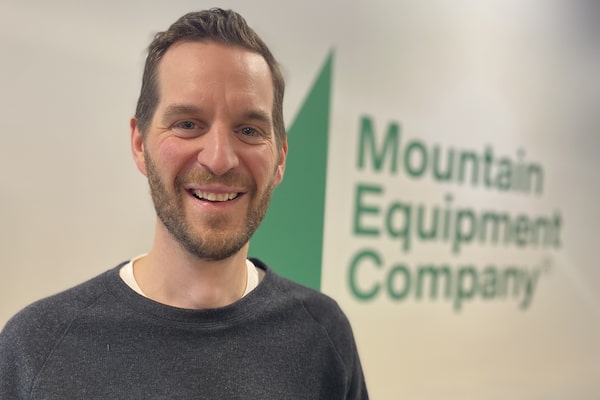
Mountain Equipment Company has named Peter Hlynsky, shown in a company handout photo, its new chief executive officer.HO/The Canadian Press
Growing up on the North Shore near Vancouver, Peter Hlynsky recalls riding his 1990s mountain bike with deep sea fishing lights strapped to his handlebars in the dead of night, while wearing hockey padding.
“That’s stuff you do when you’re a teenager and in your early 20s,” he said, laughing.
“Then you have kids and you realize you shouldn’t do that stuff any more.”
These days, the world of cycling gear has gone more high-tech, as has Hlynsky, who now presides over much of the equipment available to outdoorsy folk in Canada.
The chartered accountant and adventure lover was named chief executive of Mountain Equipment Company this week. He called the promotion a “humbling” experience.
“(MEC) has been in my life my whole life. I’ve been a part of MEC or it’s been a part of me, I guess you’d say,” he said in a Friday interview.
“It’s pretty awesome, (when) you grow up with a brand and then you … get to be part of its legacy going forward.”
Hlynsky joined the Vancouver-based outdoor gear company in 2020, serving as its chief financial officer and chief operating officer.
He succeeds Eric Claus, who led the retailer in the wake of it filing for creditor protection and being sold to U.S.-based private investment firm Kingswood Capital Management. The moves effectively dissolved the member-owned co-operative structure the company had used since it was founded by six West Coast mountaineers in 1971.
Hlynsky became a member in 1995, turning to MEC for equipment when ski touring in Canada, hiking in the Andes, rafting the Amazon River, surfing in California and kayaking through Desolation Sound and the Gulf Islands.
But even greater challenges lie ahead for Hlynsky. MEC’s last few years have been marked by the company working to resolve its debt and inventory problems, tackle steep online competition and recover from the COVID-19 pandemic, which saw stores temporarily close.
The company has put its focus squarely on appeasing customers but also overhauling its information technology systems and supply chain, said Hlynsky.
As part of that work, the retailer is moving to a larger distribution centre in Western Canada and collaborating with vendors to lower prices by ordering twice as much product.
Hlynsky has noticed the model generates more sales because it gets product moving through the system and allows the company to quickly ready itself for the next season.
The biggest benefits wind up with shoppers.
“If you go into our store right now, you can find a climbing shoe for under $100, which you haven’t seen prices like that for, like, 10 years,” said Hlynsky.
“You have a $45 fleece that used to be $150. That’s the kind of the thing we’re finding right now.”
For shoppers, it comes at optimal timing. Inflation remains high and layoffs have rocked several industries, eating into consumer spending.
Hlynsky tries to hear from shoppers as much as he can, often stopping them for a chat in MEC’s 23 stores or three locations within Hudson’s Bay Company outlets.
He’ll even question customers when he encounters them outdoors. On one recent bike ride through Whistler, he came across a geologist and MEC member dating back to 1972. The man was carrying two kayaks and kitted out in MEC gear.
He had a gripe to share with Hlynsky: he didn’t like the green square logo with MEC letters the company switched to in 2013.
Hlynsky, who also thought the logo was “terrible,” got to be the one to tell him the company had switched back to the previous logo with the famed mountains MEC in 2021.
“People were so upset by the change in the logo,” Hlynsky said.
Founding MEC member Sara Golling told CBC in 2020 she felt “grief and betrayal” at the move away from the co-op model. There was also a “Save MEC” campaign to stop the sale.
Taking on his new role, Hlynsky admits the pressure to ensure customers aren’t let down always looms.
It’s part of why he sees his biggest job as being a “steward” for the brand.
“We’re not trying to radically shift the direction of the company,” he said.
“It’s more about maintaining our core ethos, focusing on our people and our staff and making sure we take care of them and are always bringing good product to market.”